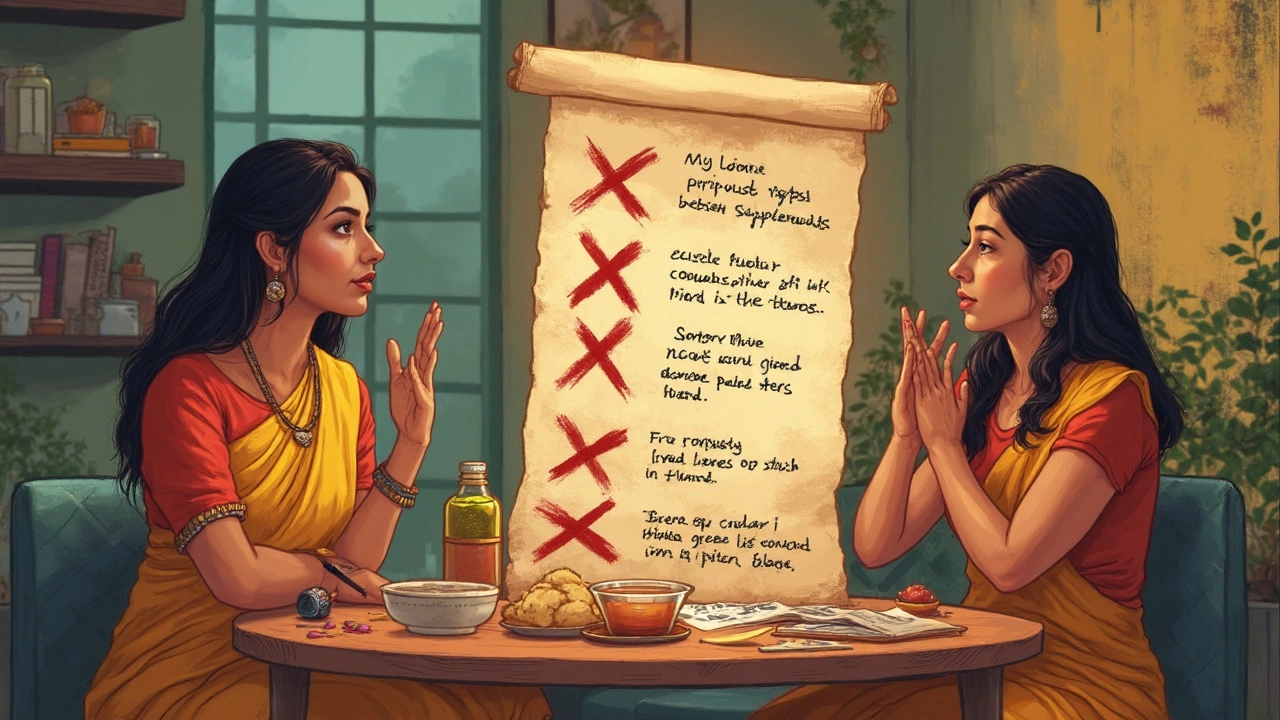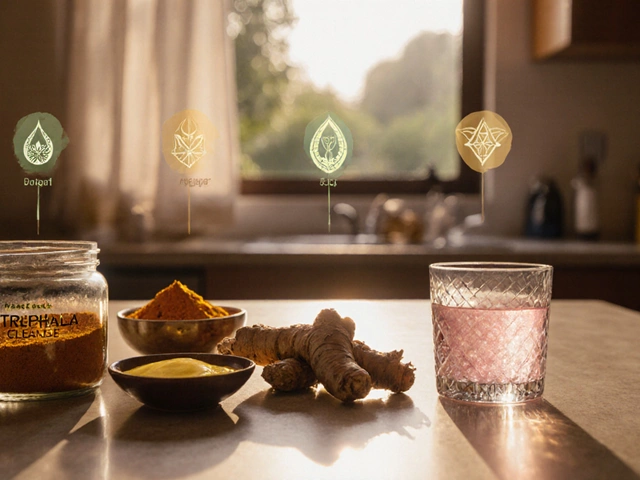Herbs feel so natural, it’s easy to forget they can turn on you if you mix the wrong ones. Most folks just grab whatever’s popular—like turmeric, ginseng, or valerian—without thinking about what happens when those herbs all end up in your body at the same time.
But here’s the deal: herbs aren’t just spices or old-timey remedies. They’re basically mini chemical factories, and sometimes those chemicals gang up in ways you’d never expect. At best, you waste your money. At worst, you can end up dizzy, bleeding, or with your liver in trouble.
Let’s be real—herb-drug interactions get a lot of attention, but mixing herbs with other herbs can be just as sketchy. Some combos jack up your risk of side effects, while others mess with how your body processes medicine or even food. That’s why it pays to know which herbal pairings are asking for trouble, especially if you’re into DIY health or juggling a cabinet full of supplements.
- Why Mixing Herbs Is Riskier Than You Think
- Famous Bad Combos: What to Watch Out For
- Everyday Herbs That Clash
- Real Problems People Have Faced
- How to Check If Your Herbs Are Safe Together
- Smart Tips for Mixing or Avoiding Herbal Supplements
Why Mixing Herbs Is Riskier Than You Think
Herbal supplements may look harmless, but mixing them isn't like making a salad. Even if each herb is "safe" on its own, shaking them together can bump up your risk of annoying—or straight up dangerous—side effects. What you might not know is, tons of herbs act on the same body systems. Mix the wrong ones, and you’re doubling or even tripling the punch.
Take blood thinners. Garlic, ginkgo, and turmeric all have blood-thinning powers. Stack them and that effect doesn’t just add up—it multiplies fast. Result? You could bruise easily or bleed more, even from a tiny cut. Bleeding risk isn’t a joke, especially if you’re already on meds or heading into surgery.
Another issue: some herbs and herbal supplements use the same liver enzymes. That means, if you’re tossing back several at once, they can crowd out each other or slow down the way your liver clears them out. You might end up with way more of a certain herb in your blood than you planned.
- Herbs like St. John's wort can rev up how fast your liver works, making other herbs or meds less effective.
- On the flip side, herbs like kava or valerian can pile on sedative effects, leaving you groggy or messing with your reflexes.
- Some combos stress your kidneys or your gut. For example, both licorice root and dandelion mess with potassium levels, which can raise your blood pressure or give you muscle cramps.
Check out this quick breakdown of what can go wrong when you mix the wrong herbal supplements:
| Herb Combo | Possible Problem |
|---|---|
| Ginkgo + Garlic | Bleeding risk skyrockets |
| St. John's Wort + Ginseng | May cause mood swings, insomnia |
| Valerian + Kava | Intense sedation, poor motor control |
| Licorice Root + Dandelion | Electrolyte imbalance, high blood pressure |
Bottom line? When you start stacking herbal supplements, you’re playing with chemicals—lots of them. A bad mix can mess you up in ways you don’t see coming. That’s why it’s smart to dig a little deeper before taking a bunch at once.
Famous Bad Combos: What to Watch Out For
When you start stacking herbs, some combos are known for causing trouble. These aren’t rare accidents—plenty of folks have run into issues when these particular blends end up in their system. If you’re taking herbal supplements from different bottles, it might seem harmless, but a few mixes could backfire fast.
Here are some of the most notorious pairs you’ll want to avoid:
- St. John’s Wort + Ginkgo Biloba: Both of these are super common for mood and memory, but together, they seriously up your risk of bleeding. People on blood thinners or with clotting problems should steer clear of this mix.
- Garlic + Ginseng: Separately, they’re heart-healthy. But mix them and you’re way more likely to see bruising and nosebleeds, especially if you already take meds like aspirin. Their combined effect can thin your blood too much.
- Valerian + Kava: Both calm you down, which sounds nice, but the double whammy can knock you out—or worse, mess with your breathing. These should never be taken together, especially if you need to drive or operate anything risky.
- Ginger + Turmeric: Both pack anti-inflammatory effects, but if you overdo it, your stomach can rebel. Too much at once can also boost the risk of bleeding for some folks, especially anyone with clotting issues.
- Ginkgo + Ginseng: Ginkgo is known for memory, and ginseng is for overall energy. But together they’ve been known to cause increased heart rate, headaches, and trouble sleeping. Even younger people in good health have reported side effects with this mix.
| Herb Mix | Common Side Effect |
|---|---|
| St. John’s Wort & Ginkgo | Increased bleeding risk |
| Garlic & Ginseng | Easy bruising, nosebleeds |
| Valerian & Kava | Drowsiness, slow breathing |
| Ginger & Turmeric | Stomach upset, bleeding |
| Ginkgo & Ginseng | Headache, fast heartbeat, insomnia |
It can get even trickier if you buy blends or teas that put these herbs together without clear warnings. And it’s not just about the amount—sometimes just having both in your routine on the same day is enough to trigger a reaction. If you see an ingredient list that combines any of these, it’s best to pass or check with an expert before taking them.
Everyday Herbs That Clash
If you think mixing regular herbs from your weekly supplement haul is harmless, think again. Some of the most popular herbal supplements actually clash in ways that nobody talks about at your average health shop.
Let’s get straight to some pairs you might spot in your kitchen or medicine cabinet:
- St. John’s Wort and Ginkgo Biloba: Both are pretty common—one’s for mood, the other for memory. Together? You might crank up your risk for bleeding since both thin the blood. That can get ugly, especially if you’re having surgery or you’re already on blood thinners.
- Garlic and Ginseng: Garlic’s famous for your heart, ginseng for energy. You mix them, and your risk of sudden drops in blood pressure or serious bruising goes way up.
- Valerian and Kava: Both get sold as stress busters or sleep aids. But stacking them means extra sedation, which can wreck your reaction times and leave you groggy long after you wake up.
- Turmeric and Ginger: These two get sprinkled in everything from teas to smoothies “for health.” Problem is, both are natural blood thinners. If you overdo the combo, you can end up with nosebleeds, bruises, or even trouble clotting if injured.
- Licorice root and any stimulant (like caffeine or guarana): Licorice can raise blood pressure by itself. Throw in something upping your heart rate and now you’re pushing your BP into the danger zone.
Here’s a quick look at how some of these combos impact your risk of side effects:
| Herb Combo | Usual Reason Taken | Main Risk |
|---|---|---|
| St. John’s Wort + Ginkgo | Mood + Brain | High bleeding risk |
| Valerian + Kava | Sleep/stress | Over-sedation |
| Turmeric + Ginger | Inflammation/pain | Clotting issues |
| Garlic + Ginseng | Heart + Energy | Bleeding/low blood pressure |
Lots of people are trying to stack their “superfoods” without thinking about what happens when they mix. Just because an herbal supplement is natural doesn’t mean it plays nice with others. If you’re using more than one, double-check their side effects before you toss them all in your morning shake.

Real Problems People Have Faced
Tons of people have gotten burned by mixing the wrong herbal supplements. This isn’t just theory—there are real stories and legit case reports about folks who ran into big trouble with their favorite herbs. The scariest thing? Problems often show up fast, and many never saw it coming until they felt awful or landed in urgent care.
Take St. John’s wort, for example. It’s famous for mood support, but when mixed with other herbal supplements or even some meds, it can cause wild mood swings, headaches, and even make you feel way more anxious. One known case involved someone who mixed St. John’s wort with ginseng and ginkgo. The results? Unpredictable blood pressure, major headaches, and sleeping troubles that just wouldn’t quit.
Let’s talk bleeding risk. Combining ginkgo and garlic might sound harmless, but both thin your blood. A case out of New York had a person rushed to the ER with nosebleeds that wouldn’t stop after taking both daily. Blood work showed their blood was way too thin—and all from natural products!
Here’s a quick comparison showing some herb combos and the kinds of issues people have faced, based on real incident reports:
| Herb Combination | Problem Reported |
|---|---|
| Ginkgo + Garlic | Severe bleeding, nosebleeds |
| St. John’s Wort + Ginseng | Mood swings, headaches, insomnia |
| Valerian + Kava | Extreme drowsiness, confusion |
| Echinacea + Licorice Root | Increased blood pressure |
This stuff isn’t rare—poison control centers have seen thousands of calls every year about herbal supplements gone wrong. People often rely on vibes or family advice, skipping the research or not talking to their doctor. That’s where most problems start.
If you’re thinking about trying a bunch of herbs at once (especially for things like energy, stress, or sleep), it’s smart to look up the combos first. Check if anyone else has had issues, or better, loop your healthcare provider in. Trust me, a quick search now beats a miserable night or a hospital visit later.
How to Check If Your Herbs Are Safe Together
Honestly, trying to figure out which herbs play nice together feels like a guessing game—unless you know what to look for. Here’s how you can do it smart, without risking your health or your wallet.
First thing: always check the label for warnings about interactions or ask your pharmacist. Even simple combos like ginkgo and garlic can thin your blood too much, especially if you’re already taking meds for it. A 2023 report in the "Journal of Herbal Medicine" showed almost 20% of people who used more than one herb had some kind of side effect after mixing them. That’s not nothing.
“Even ‘natural’ supplements can interact in ways we don’t expect. A quick check with your healthcare provider can make all the difference,” says Dr. Linda Cho, a clinical herbal specialist at UCSF.
The next step is to look up each of your herbal supplements individually using a reliable resource. Skip random blogs—websites like the National Center for Complementary and Integrative Health (NCCIH), Memorial Sloan Kettering, and the Natural Medicines Database actually cite research, not just rumors.
- Search your herbs on these databases. Look for sections called “interactions” or “warnings.”
- Write down anything that mentions your combo (for example, ginseng + St. John’s Wort = mood swings or insomnia).
- If you see anything sketchy or hard to understand, flag it for your doctor or pharmacist.
A lot of pharmacies now have interaction-checker tools online. Plug in your herbs and see if any red flags pop up. Don’t forget to include over-the-counter stuff and regular meds too—sometimes it’s the mix of everything that causes real trouble.
| Herb Combo | Possible Problem |
|---|---|
| St. John’s Wort + Ginkgo | Increased risk of serotonin syndrome, headaches |
| Valerian + Kava | Drowsiness, liver stress |
| Ginger + Garlic | Excessive bleeding risk |
| Licorice + Diuretic Herbs | Potassium loss, high blood pressure |
If you’ve made a DIY mix and you start feeling off—like heart racing, headaches, or stomach pain—stop taking everything right away, and get your doctor in the loop. These signs mean your herbal supplements might be clashing inside you.
One last tip: stick to one new herb at a time for at least a week. That way, if your body doesn’t like it, you know exactly what triggered the problem.
Smart Tips for Mixing or Avoiding Herbal Supplements
Here’s the truth: You don’t need a PhD to stay safe with herbs and herbal supplements, but you do need to stick to some common-sense rules. A big mistake people make is thinking if one herb is good, pairing it with another will boost results. Not always—you might just double up on side effects.
- Stay simple. Don’t stack more than two new herbs at a time. That way, if you feel weird, you know what’s causing it.
- Check for overlaps. Many herbs act as blood thinners (like garlic, ginkgo, and ginger). Pile those up, and you invite easy bruising or bleeding.
- Always tell your doctor. They’re not going to roll their eyes—herb combos can mess up anesthesia, dental work, even birth control effectiveness. Be honest about everything you’re taking, including those “natural” pills.
- Look up known interactions. The National Center for Complementary and Integrative Health and MedlinePlus are gold for checking which herbs shouldn’t be paired.
- Filter out sketchy advice. Social media is loaded with bad tips. Stick to advice from sources with real credentials, not influencers trying to sell you a cleanse.
- Know your body. Are you on prescription meds, or do you have conditions like diabetes, clotting issues, or high blood pressure? Some herbal supplements are off-limits if you do.
Sometimes numbers make things clearer. Here’s a quick table of herbs that are notorious for causing trouble when combined:
| Herb 1 | Herb 2 | Possible Risk |
|---|---|---|
| St. John's Wort | Ginseng | Overstimulation, anxiety, high blood pressure |
| Ginkgo Biloba | Garlic | Increased bleeding risk |
| Valerian | Kava | Extreme drowsiness, liver stress |
| Licorice Root | Hawthorn | Irregular heart rhythms |
Before grabbing that new herbal blend at the store, flip the bottle and see what’s in the mix. Watch for stuff that sounds different but works the same way, like multiple sedatives or blood thinners. When in doubt, ask your pharmacist—they actually get trained on herbs and herbal supplement interactions these days.

 Calorie Needs for a 55‑Year‑Old Woman to Lose Weight
Calorie Needs for a 55‑Year‑Old Woman to Lose Weight
 How to Drop 20 Pounds Fast: Proven Weight Loss Tactics That Work
How to Drop 20 Pounds Fast: Proven Weight Loss Tactics That Work
 How Long Does It Take for a Total Knee Replacement to Stop Hurting?
How Long Does It Take for a Total Knee Replacement to Stop Hurting?
 Ayurvedic Cleanse Side Effects: What to Watch For
Ayurvedic Cleanse Side Effects: What to Watch For
 Pitta Person Traits: What Sets Them Apart in Ayurveda
Pitta Person Traits: What Sets Them Apart in Ayurveda